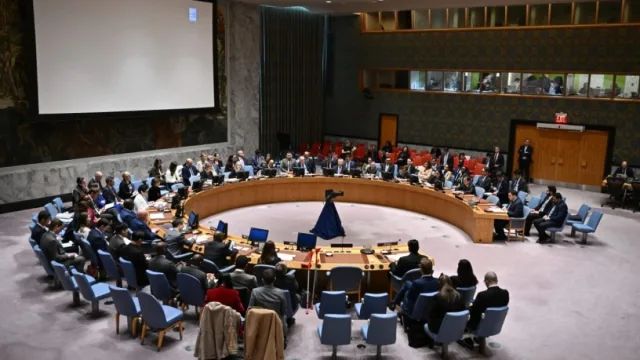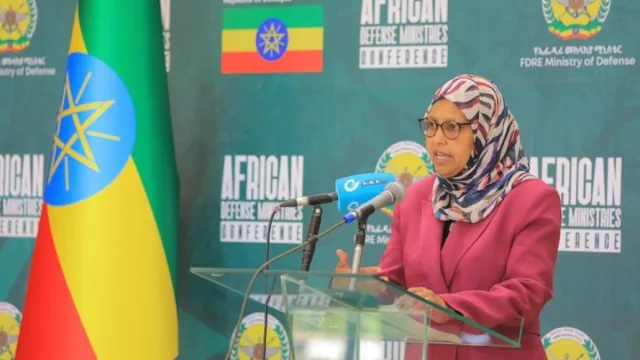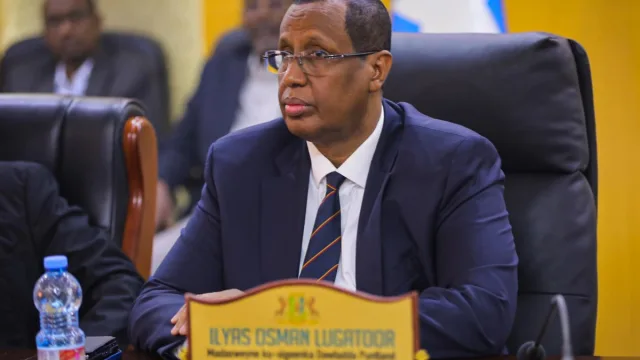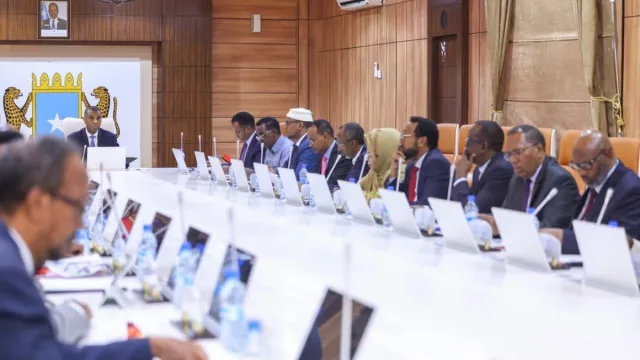A United Nations panel that monitors compliance with U.N. sanctions on Somalia has accused the country’s…

A United Nations panel that monitors compliance with U.N. sanctions on Somalia has accused the country’s president, a former minister, and a U.S. law firm of conspiring to divert Somali assets recovered abroad, according to a new report.
The Somalia and Eritrea Monitoring Group, an 8-person committee, disclosed the findings in a confidential report to the U.N. Security Council’s Somalia/Eritrea sanctions committee. Reuters reviewed a copy of the 37-page document.
The U.N. Monitoring Group said the information it has gathered so far “reflects exploitation of public authority for private interests and indicates at the minimum a conspiracy to divert the recovery of overseas assets in an irregular manner.”
Most of the overseas assets were frozen at the outset of the civil war in 1991 and include cash and gold held in banks during two decades of chaos and conflict in Somalia, as well as government properties on foreign soil.
What the monitors describe as a conspiracy involved the U.S.-based law firm Shulman Rogers, President Hassan Sheikh Mohamud and his office, former foreign minister Fawzia Yusuf H. Adam, as well as two other individuals whom the monitors said acted as liaisons between Shulman Rogers and Somalia.
If the findings are accurate, the monitors’ report could cast a pall over President Mohamud and potentially scare off foreign donors who have pledged billions to rebuild his shattered nation after two decades of chaos.
All those accused of involvement in the plan to divert assets have denied any wrongdoing. Several accused the chairman of the Monitoring Group, Jarat Chopra, of dubious investigative methods and making baseless assertions.
Former foreign minister Adam, who is now a lawmaker in the Somali parliament, said she never profited from the Shulman Rogers contract and that she had not pressured Yassur Abrar, Somalia’s former central bank governor. “As a foreign minister, my role was to build the image of Somalia, not to conspire and defame my name and that of my government.”
The president’s office said it could not comment in detail on the allegations in the report because it has not been made public.
Shulman Rogers reacted strongly to the Monitoring Group’s report about its role in the alleged conspiracy – which it has not seen – as well as the group’s assessment that the arrangements for recovering Somali assets were “contrary to the public good.” Jeremy Schulman said “the public good of Somalia has been well served by the work we have done.” He blamed the findings in the report on the group’s Chairman Chopra, saying he was not a “reliable source for truthful information about the goings-on in Somalia.”
Chopra said he stood by the group’s findings and declined to comment further.
In February, Reuters reported on some of the findings that have now been raised in the Monitoring Group’s report. The Reuters story focused on last year’s resignation by Somalia’s central bank governor, which threw Western donors into a quandary over supporting a government they need to fight al Qaeda’s local allies.
A 2013 U.N. Monitoring Group report said individuals in Mohamud’s government used the Somali central bank as a personal “slush fund”, with an average 80 percent of withdrawals made for private purposes. The presidency and the then-central bank governor Abdusalam Omer have strongly denied that accusation..
In its latest report, the Monitoring Group said that “a complex architecture of multiple secret contracts, which defied a separation of powers between the Presidency and the Central Bank, created the opportunity and rationalization for the misappropriation of public resources.”
“‘Pie-cutting’ of overseas assets by those involved in the project entailed retention of excessive percentages and direct payments from recovered assets as well as attempts to circumvent deposits in the Central Bank of Somalia,” it added.
FLED FROM MOGADISHU
Abrar, the former central bank governor who was also a former Citigroup vice president, quit last October after seven weeks on the job, alleging she had been pressured to sign a contract with Shulman Rogers that she feared could invite corruption at the central bank.
According to the new report, she sent her resignation from Dubai after fleeing from Mogadishu out of fear for her safety.
The Monitoring Group said it had followed up on a number of Abrar’s allegations and her concerns about the contract and the planned scheme for the recovery of Somalia’s overseas assets.
One of her main worries, the monitors said, was a clause in a July 2013 contract with Shulman Rogers that gave the law firm a bonus of 5 percent of recovered assets in addition to its fees and for Shulman Rogers to retain a further 6 percent of recovered assets for undefined costs and expenses.
“Ms. Abrar considered this clause for undefined costs and expenses to be for hidden fees and ultimately understood that it was meant as a side payment to be divided two percent each between Foreign Minister Adam, Musa Haji Mohamed Ganjab and Abdiaziz Hassan Giyaajo Amalo,” the report said.
However, the Shulman Rogers contract, reviewed by Reuters, does not state that any individuals would be paid from the 6 percent clause.
The U.N. Monitoring Group report alleges that Amalo, a U.S. citizen of Somali descent, and Ganjab were government advisers who also acted as facilitators who were “serving as a regular channel between Shulman Rogers and the President”.
A Shulman Rogers representative vehemently denied that the firm had paid or sought to pay any government officials.
Ganjab, a Somali businessman, did not respond to repeated requests for comment. Amalo told Reuters in an emailed statement that he was never a government adviser and dismissed allegations against him as “false and malicious”.
FEARS OF DIVERSION OF FUNDS
The monitors said Abrar raised her concerns about the 6 percent contract clause with the president in September 2013.
“The President informed her that Adam, Ganjab and Amalo had worked hard for their money and that they had earned and deserved the commission of six percent,” the report said.
“Abrar appealed to the President to reconsider his support for this, but he simply thanked her and asked her to read through the contract,” according to the report.
Abrar never signed off on the contract for Shulman Rogers. The report said she had also been pressured by the then-deputy finance minister to open a bank account in Dubai against her wishes that she feared could be used for the diversion of Somali funds. Abrar resigned without opening it.
After consulting with the World Bank, the Somali president’s office said in a statement to Reuters that it revoked a power of attorney it had granted to Shulman Rogers in May and was renegotiating its contract with the law firm.
“International advice will continue to be solicited as the national asset recovery proceeds,” the statement added.





